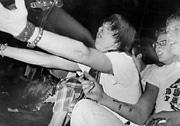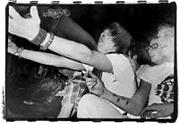IT’S 3PM ON A SATURDAY, a time when the Sit & Spin in Belltown is usually quiet. A crowd of teenagers lines up to enter the back room where rock shows take place, an area that until a few months ago was off-limits to those under 21. They’re here to see bands play, and they will: It’s all perfectly legal.
Once on the sidelines of the all-ages issue, Seattle’s nightclub owners have stepped in to fill the hole left by the closure last year of RKCNDY and the Velvet Elvis, booking matinee shows for those who aren’t yet old enough to drink. It took a federal court ruling to allow such shows to happen, and while this seems like a reason to rejoice, it’s given rise to a new debate: Where’s the best place for kids to see shows—in a space they can call their own or in a bar?
It’s more than a question of atmosphere, however; club owners and booking agents must wrestle with state-imposed time restrictions and the problems they present. Adding to the complexity is a proposal by members of the City Council- spawned Music and Youth Task Force to open a city-run all-ages club, a sort of experiment in European-style cultural backing.
At present, kids wanting to see live music must settle for one of two choices: going to a matinee show at a club like Sit & Spin, which must adhere to a 10pm curfew on all-ages events; or finding their way to the Paradox Theater, a new alcohol-free venue in the U District.
The former option isn’t terribly attractive to some. “The difference between all-ages shows and over-21 is huge,” says Chris Walla, guitarist for Death Cab for Cutie, which recently played an all-ages matinee at the Breakroom. “I grew up here, and the bar was such a taboo thing. It’s such a barrier.”
Another obstacle is the time restriction, a remnant of the Liquor Board’s tight control on licensees. Club bookers have to contend with making audiences accustomed to figuring out if a show is alcohol-free, early, late, or mixed; a recent all-ages concert at the Showbox featured two secure drinking areas and long lines to enter them, causing many adult attendees to grumble.
Meg Watjen, the former Velvet Elvis booker who now arranges all-ages shows at Graceland, finds the situation frustrating as well. “The biggest thing we’re facing is having to get the kids out by 10pm, and that’s completely unreasonable,” she says. “If I have a [well-known touring] band coming, I have to make a choice between having one show that ends at 10, or I have to do two shows, one for all-ages and one for 21-and-over. We have to train people to read show times; otherwise they’ll be coming for shows that are already over.”
Besides helping fill the void left by the Velvet Elvis and RKCNDY’s closure, the operators of the Paradox also hope to use their nonalcoholic, not-for-profit status to offer shows that go beyond the 10pm limit and that don’t place teens in the unfamiliar barroom setting.
Paradox booking agent Jason Norris argues that an all-ages venue provides die-hard young fans with a better environment, which is part of what impelled him and owner Leif Moi to run the club. “The thing about going to a bar is you’re going to drink and if there’s music there, well good,” Norris notes. “But if a kid goes to a show he’s going there for the band. Kids are much more dedicated.”
TAKING ANOTHER ROUTE entirely, University of Washington students James Keblas and Shannon Stewart, along with other members of the Music and Youth Task Force, have proposed getting the city to back a nonprofit, all-ages music venue. The “Vera Project,” which Keblas named after a city-run club in Holland that he hopes to emulate, has already received the support of council member Richard Conlin.
There’s proof that city-club partnerships can work at home, too. The Old Fire House in Redmond has been hosting all-ages shows for more than seven years; the Redmond Parks and Recreation Department owns and maintains the building, and tickets pay for the booking and security staff.
Keblas says that such a venue is not only a solution to Seattle’s all-ages quandary, but also a municipal duty.
“As much as I appreciate the bars and their philanthropy, it’s basically sad that the bars are taking care of the kids and the city isn’t,” Keblas says. “We want the city to provide the venue and then a nonprofit to run it.” With help from the task force, which has been studying ways to improve youth-access to live music for more than a year, Keblas thinks he can have a written proposal ready by summer. A city-run, all-ages music center would be at least a year off.
Until then, young clubgoers will have to get used to the bar scene, albeit without access to the alcohol—and the attitude—that’s made Seattle a city with a vibrant nightlife. At the Sit & Spin matinee, 18-year-old Randi Simmons surveys the surroundings and says she’s glad to have a place to see live music. But something just isn’t right.
“There’s this mood in the air that it’s so hip . . .” she says, “that it sucks.”






